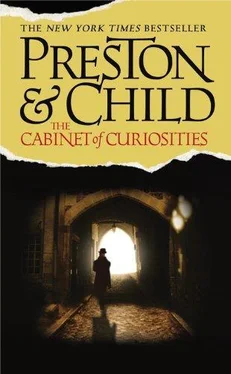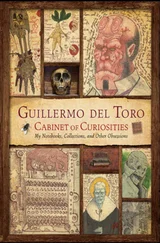Douglas Preston - The Cabinet of Curiosities
Здесь есть возможность читать онлайн «Douglas Preston - The Cabinet of Curiosities» весь текст электронной книги совершенно бесплатно (целиком полную версию без сокращений). В некоторых случаях можно слушать аудио, скачать через торрент в формате fb2 и присутствует краткое содержание. Жанр: Триллер, на английском языке. Описание произведения, (предисловие) а так же отзывы посетителей доступны на портале библиотеки ЛибКат.
- Название:The Cabinet of Curiosities
- Автор:
- Жанр:
- Год:неизвестен
- ISBN:нет данных
- Рейтинг книги:3 / 5. Голосов: 1
-
Избранное:Добавить в избранное
- Отзывы:
-
Ваша оценка:
- 60
- 1
- 2
- 3
- 4
- 5
The Cabinet of Curiosities: краткое содержание, описание и аннотация
Предлагаем к чтению аннотацию, описание, краткое содержание или предисловие (зависит от того, что написал сам автор книги «The Cabinet of Curiosities»). Если вы не нашли необходимую информацию о книге — напишите в комментариях, мы постараемся отыскать её.
The Cabinet of Curiosities — читать онлайн бесплатно полную книгу (весь текст) целиком
Ниже представлен текст книги, разбитый по страницам. Система сохранения места последней прочитанной страницы, позволяет с удобством читать онлайн бесплатно книгу «The Cabinet of Curiosities», без необходимости каждый раз заново искать на чём Вы остановились. Поставьте закладку, и сможете в любой момент перейти на страницу, на которой закончили чтение.
Интервал:
Закладка:
THE BASEMENT ROOM was small and silent. In its simplicity it resembled a monk’s cell. Only a narrow-legged wooden table and stiff, uncomfortable chair broke the monotony of the uneven stone floor, the damp unfinished walls. A black light in the ceiling threw a spectral blue pall over the four items upon the table: a scarred and rotting leather notebook; a lacquer fountain pen; a tan-colored length of India-rubber; and a hypodermic syringe.
The figure in the chair glanced at each of the carefully aligned items in turn. Then, very slowly, he reached for the hypodermic. The needle glowed with strange enchantment in the ultraviolet light, and the serum inside the glass tube seemed almost to smoke.
He stared at the serum, turning it this way and that, fascinated by its eddies, its countless miniature whorls. This was what the ancients had been searching for: the Philosopher’s Stone, the Holy Grail, the one true name of God. Much sacrifice had been made to get it — on his part, on the part of the long stream of resources who had donated their lives to its refinement. But any amount of sacrifice was acceptable. Here before him was a universe of life, encased in a prison of glass. His life. And to think it all started with a single material: the neuronal membrane of the cauda equina, the divergent sheaf of spinal ganglia with the longest nerve roots of all. To bathe all the cells of the body with the essence of neurons, the cells that did not die: such a simple concept, yet so damnably complicated in development.
The process of synthesis and refinement was tortuous. And yet he took great pleasure in it, just as he did in the ritual he was about to perform. Creating the final reduction, moving from step to step to step, had become a religious experience for him. It was like the countless Gnostic keys the believer must perform before true prayer can begin. Or the harpsichordist who works his way through the twenty-nine Goldberg Variations before arriving at the final, pure, unadorned truth Bach intended.
The pleasure of these reflections was troubled briefly by the thought of those who would stop him, if they could: who would seek him out, follow the carefully obscured trail to this room, put a halt to his noble work. The most troublesome one had already been punished for his presumption — though not as fully punished as intended. Still, there would be other methods, other opportunities.
Placing the hypodermic gently aside, he reached for the leather-bound journal, turned over the front cover. Abruptly, a new smell was introduced into the room: must, rot, decomposition. He was always struck by the irony of how a volume that, over the years, had itself grown so decayed managed to contain the secret that banished decay.
He turned the pages, slowly, lovingly, examining the early years of painstaking work and research. At last, he reached the end, where the notations were still new and fresh. He unscrewed the fountain pen and laid it by the last entry, ready to record his new observations.
He would have liked to linger further but did not dare: the serum required a specific temperature and was not stable beyond a brief interval. He scanned the tabletop with a sigh of something almost like regret. Though of course it was not regret, because in the wake of the injection would come nullification of corporeal poisons and oxidants and the arresting of the aging process — in short, that which had evaded the best minds for three dozen centuries.
More quickly now, he picked up the rubber strap, tied it off above the elbow of his right arm, tapped the rising vein with the side of a fingernail, placed the needle against the antecubital fossa, slid it home.
And closed his eyes.
TEN
NORA WALKED AWAY from the red gingerbread Peekskill station, squinting against the bright morning sun. It had been raining when she’d boarded the train at Grand Central. But here, only a few small clouds dotted the blue sky above the old riverfront downtown. Three-story brick buildings were set close together, faded facades looking toward the Hudson. Behind them, narrow streets climbed away from the river, toward the public library and City Hall. Farther still, perched on the rocky hillside, lay the houses of the old neighborhoods, their narrow lawns dotted with ancient trees. Between the aging structures lay a scattering of smaller and newer houses, a car repair shop, the occasional Spanish-American mini-market. Everything looked shabby and superannuated. It was a proud old town in uncomfortable transition, clutching to its dignity in the face of decay and neglect.
She checked the directions Clara McFadden had given her over the telephone, then began climbing Central Avenue. She turned right on Washington, her old leather portfolio swinging from one hand, working her way toward Simpson Place. It was a steep climb, and she found herself panting slightly. Across the river, the ramparts of Bear Mountain could be glimpsed through the trees: a patchwork of autumnal yellows and reds, interspersed with darker stands of spruce and pine.
Clara McFadden’s house was a dilapidated Queen Anne, with a slate mansard roof, gables, and a pair of turrets decorated with oriel windows. The white paint was peeling. A wraparound porch surrounded the first floor, set off by a spindlework frieze. As she walked up the short drive, the wind blew through the trees, sending leaves swirling around her. She mounted the porch and rang the heavy bronze bell.
A minute passed, then two. She was about to ring again when she remembered the old lady had told her to walk in.
She grasped the large bronze knob and pushed; the door swung open with the creak of rarely used hinges. She stepped into an entryway, hanging her coat on a lone hook. There was a smell of dust, old fabric, and cats. A worn set of stairs swept upward, and to her right she could see a broad arched doorway, framed in carved oak, leading into what looked like a parlor.
A voice, riven with age but surprisingly strong, issued from within. “Do come in,” it said.
Nora paused at the entrance to the parlor. After the bright day outside, it was shockingly dim, the tall windows covered with thick green drapes ending in gold tassels. As her eyes slowly adjusted, she saw an old woman, dressed in crepe and dark bombazine, ensconced on a Victorian wing chair. It was so dark that at first all Nora could see was a white face and white hands, hovering as if disconnected in the dimness. The woman’s eyes were half closed.
“Do not be afraid,” said the disembodied voice from the deep chair.
Nora took another step inside. The white hand moved, indicating another wing chair, draped with a lace antimacassar. “Sit down.”
Nora took a seat gingerly. Dust rose from the chair. There was a rustling sound as a black cat shot from behind a curtain and disappeared into the dim recesses of the room.
“Thank you for seeing me,” Nora said.
The bombazine crackled as the lady raised her head. “What do you want, child?”
The question was unexpectedly direct, and the tone of the voice behind it sharp.
“Miss McFadden, I wanted to ask you about your father, Tinbury McFadden.”
“My dear, you’re going to have to tell me your name again. I am an old lady with a fading memory.”
“Nora Kelly.”
The old woman’s claw reached out and pulled the chain of a lamp that stood beside her chair. It had a heavy tasseled lamp shade, and it threw out a dim yellow light. Now Nora could see Clara McFadden more clearly. Her face was ancient and sunken, pale veins showing through parchment-paper skin. The lady examined her for a few minutes with a pair of glittering eyes.
“Thank you, Miss Kelly,” she said, turning off the lamp again. “What exactly do you want to know about my father?”
Читать дальшеИнтервал:
Закладка:
Похожие книги на «The Cabinet of Curiosities»
Представляем Вашему вниманию похожие книги на «The Cabinet of Curiosities» списком для выбора. Мы отобрали схожую по названию и смыслу литературу в надежде предоставить читателям больше вариантов отыскать новые, интересные, ещё непрочитанные произведения.
Обсуждение, отзывы о книге «The Cabinet of Curiosities» и просто собственные мнения читателей. Оставьте ваши комментарии, напишите, что Вы думаете о произведении, его смысле или главных героях. Укажите что конкретно понравилось, а что нет, и почему Вы так считаете.










